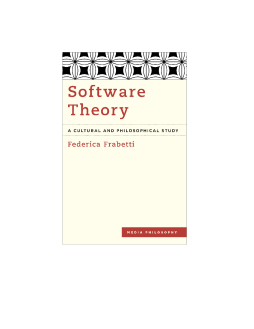
Additional Information
Book Details
Abstract
The cultural and philosophical study of software is crucial, both within and outside of the university, at an international level and across disciplines. Software is increasingly considered the focus of digital media studies because of the perceived need to address the invisibility, ubiquity, and power of digital media. Yet software remains quite obscure to students and scholars in media studies, the social sciences, and the humanities.
This unique book engages directly in close readings of technical texts and computer code in order to show how software works and in what sense it can be considered constitutive of culture and even of human thought. Federica Frabetti combines this with an engagement with thinkers such as Bernard Steigler and Jacques Derrida to problematize the very nature of the conceptual system on which software is based and which has shaped its historical evolution. The book argues for a radical demystification of software and digital technologies by addressing the mystery that surrounds its function and that affects our comprehension of its relationship between technology, philosophy, culture, and society.
Software Theory is the definitive cultural analysis of software qua software, vividly troubling the critical tendency to regard it strictly in terms of functionality, design, or use. Frabetti writes out of a deep knowledge of both continental philosophy and software engineering that is nothing short of awe inspiring. An invaluable contribution to “Software Studies” that will at the same time shake up the central paradigms of the field.
Rita Raley, University of California, Santa Barbara
Federica Frabetti is senior lecturer in communication, media and culture at Oxford Brookes University, UK. She has a diverse professional and academic background in the humanities and ICT and has published numerous articles on the cultural study of technology, digital media and software studies, cultural theory, and gender and queer theory.
This book represents a landmark in the field of techno-cultural studies. Frabetti's deconstructive reading of software and code reveals their key role within the scriptorium of contemporary culture.
This is a highly original contribution to understanding the writing/machine relationship and will give pause for thought amongst all those who suppose that the technics of inscription can be studied independently of the question of language itself.
Dave Boothroyd, Professor of Media, Culture and Communication, Lincoln School of Film and Media, University of Lincoln, author of Ethical Subjects in Contemporary Culture
Putting philosophers (Derrida, Stiegler) in dialogue with engineers (Fred Brooks, Eric S. Raymond), Software Theory offers computer scientists and cultural theorists new ways to read, write, and think software. To study software, Frabetti suggests, is to risk being ensnared in a strange loop: culture explains technology; technology explains culture. But Frabetti considers software as nothing more or less than an advanced form of writing, and thereby advances a much-needed politics of transparency, revealing the precarity of this bedrock of contemporary society.
Scott Dexter, Professor of Computer and Information Science at Brooklyn College
